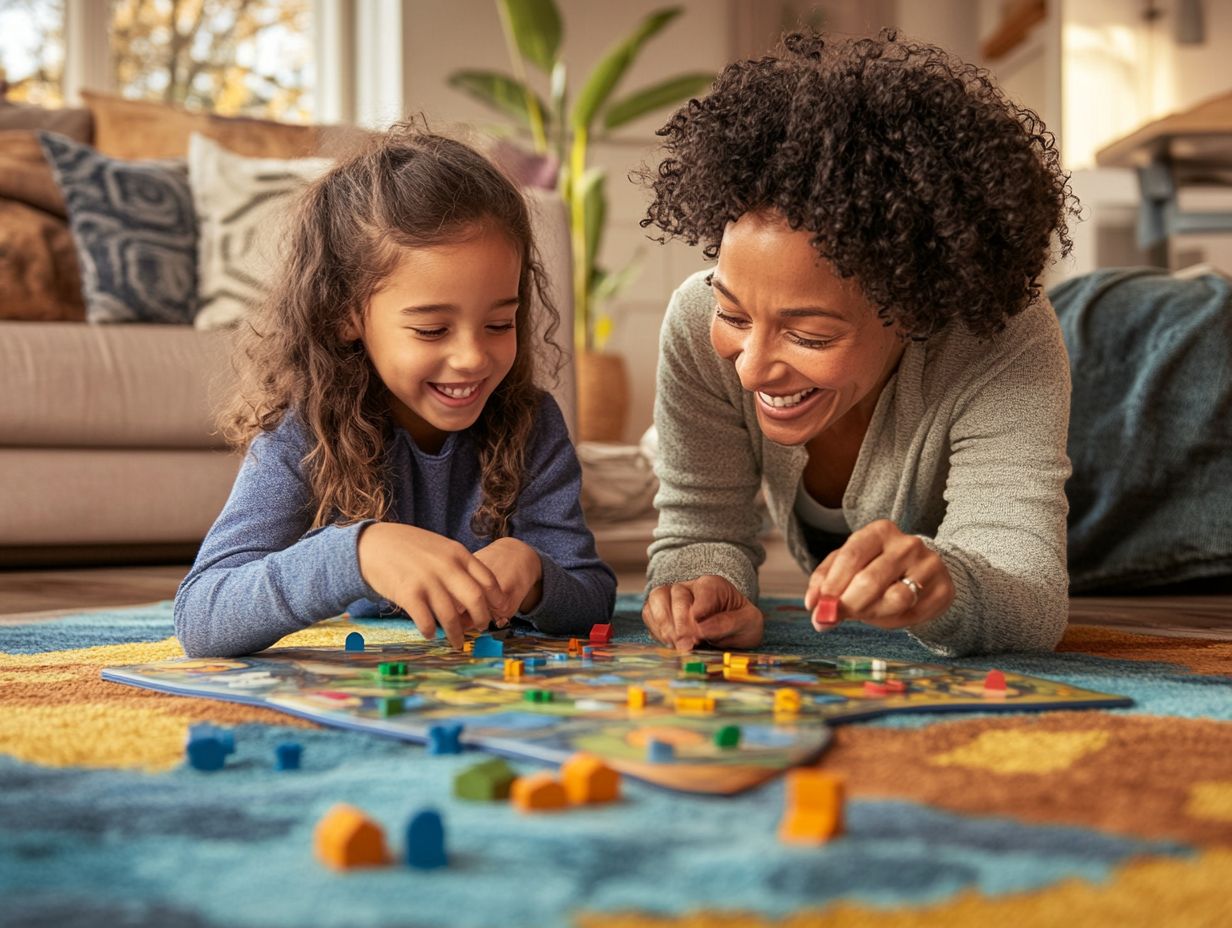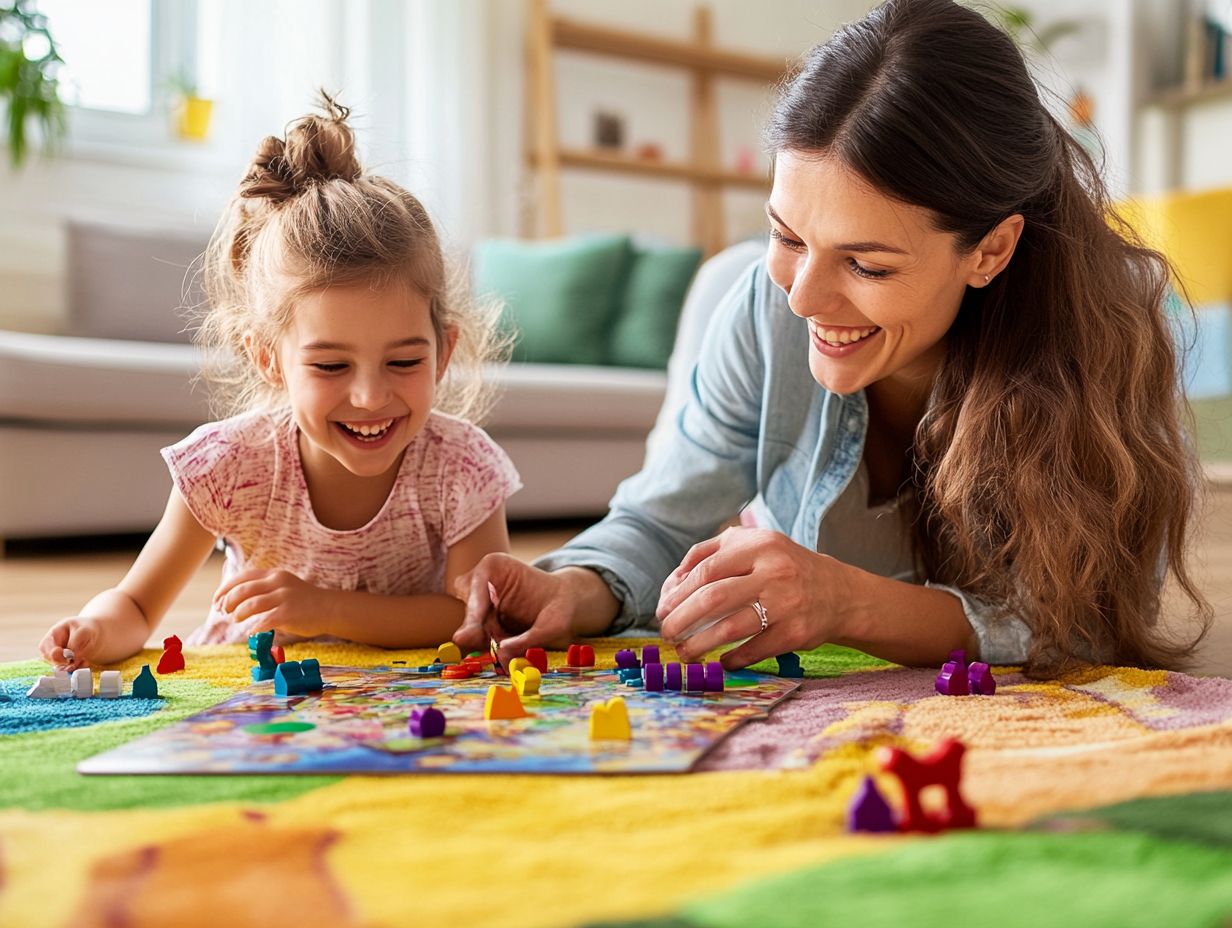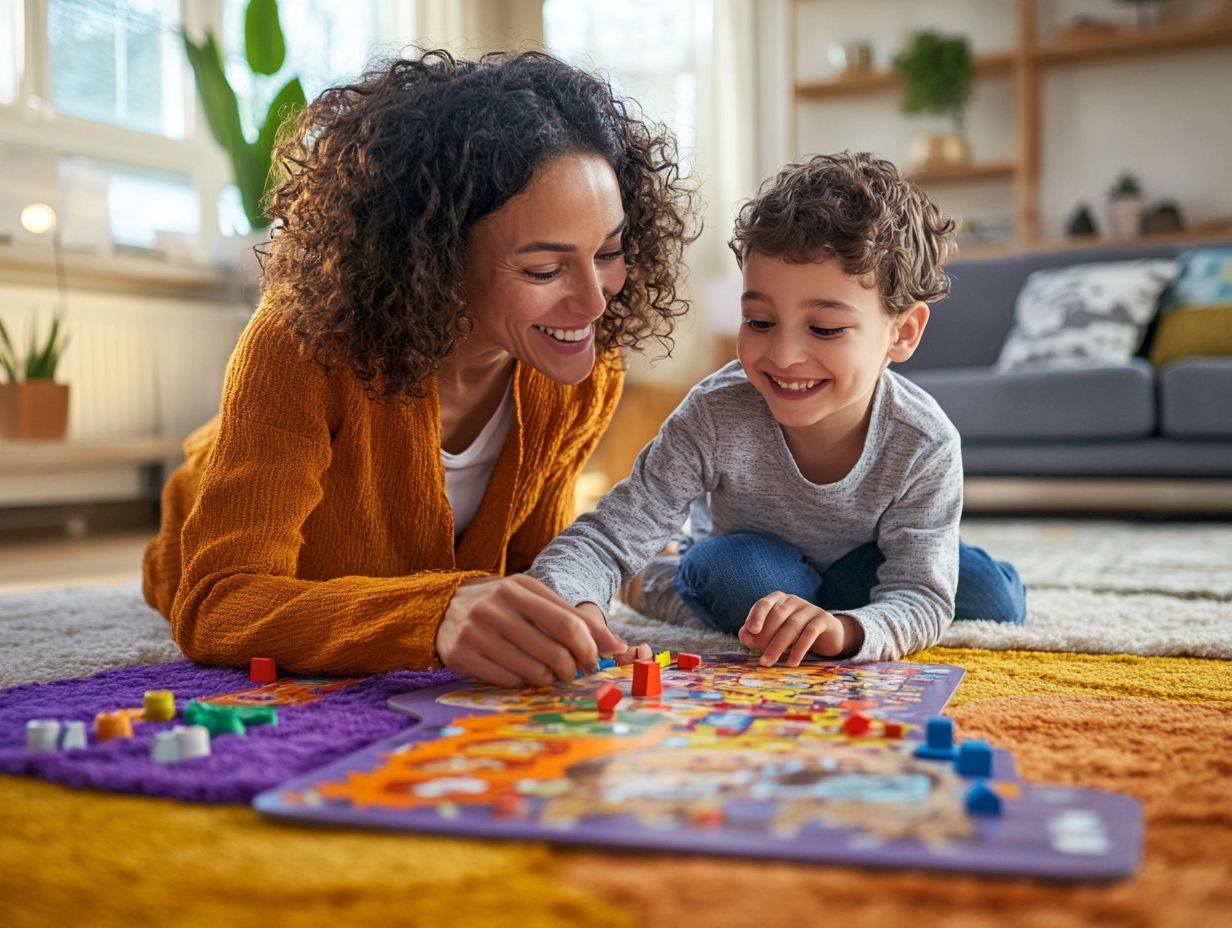5 Games that Promote Parent-Child Interaction
Contents
- Engaging Activities to Strengthen Parent-Child Connections
- Family Activities for Bonding and Learning
- 4. Cooking or Baking Together
- 5. Outdoor Activities
- Why Is Parent-Child Interaction Important for Child Development?
- What Are Some Tips for Making Game Time More Meaningful and Effective?
- Frequently Asked Questions
- What are some popular games that promote parent-child interaction?
- How do these games encourage parent-child bonding?
- What are the benefits of playing games together as a family?
- Top Educational Games for Parent-Child Interaction
- Enhancing Interaction in Educational Games
- The Developmental Benefits of Educational Games
Engaging Activities to Strengthen Parent-Child Connections
In today’s fast-paced world, meaningful interactions between you and your child are more crucial than ever. Engaging in fun games and family activities presents a delightful opportunity to strengthen these connections while simultaneously promoting essential skills in your little one.
Get ready to discover five fantastic activities that will bring joy and connection to your family! This article covers board games, scavenger hunts, charades, cooking or baking together, and outdoor adventures that not only entertain but also nurture communication skills, teamwork, and relationship building.
Throughout the discussion, you’ll uncover the significance of parent-child interaction, how games can enrich these shared moments, and valuable tips for ensuring that game time is truly impactful. Prepare to explore how the power of play, including creative play ideas and sensory activities, can elevate your relationship with your child!
Why These Activities Matter
Key Takeaways:

- Board games provide a fun and engaging way for parents and children to spend quality time together while also promoting skills such as communication, problem-solving, and teamwork. These games can be part of your daily routine to foster emotional and cognitive skills.
- Scavenger hunts encourage parent-child interaction by allowing families to work together to solve clues and complete tasks, fostering creativity and decision-making skills.
- Charades is a great game for promoting communication and nonverbal cues between parents and children, helping to strengthen their relationships and understanding of one another.
1. Board Games
Board games present an exceptional opportunity for you and your child to connect. They create quality moments that enhance a range of developmental skills, including emotional, cognitive, and social abilities all while fostering laughter and engaging interactions.
This special playtime can also be a fun way to assess developmental milestones and skills. When you dive into board games together, you nurture your child’s imagination and creativity, promoting problem-solving and self-control through structured play.
By crafting memories around the table, you strengthen family bonds and encourage positive interactions, ensuring that both you and your child reap the rewards of this interactive experience. With a vast array of board games available for different age groups, you can easily find options that cater to everyone’s interests and abilities.
For younger children, games like ‘Candy Land’ and ‘Chutes and Ladders’ introduce fundamental concepts like turn-taking and color recognition through their vibrant visuals and straightforward rules. These turn-taking games are also excellent for nurturing self-control and joint attention.
As your children grow, they can explore titles such as ‘Carcassonne’ and ‘Ticket to Ride’, which enhance strategic thinking and teamwork, further enriching their cognitive skills. Beyond enjoyment, these games also foster essential communication skills as players negotiate, share ideas, and collaborate toward a common goal, reinforcing the value of teamwork in a lively and enjoyable environment.
Don’t miss out on the magic of play! Start bonding with your child today!
2. Scavenger Hunts
Scavenger hunts are the perfect blend of fun and skill development, making them an engaging interactive game you can easily organize for your children. This delightful family activity not only boosts cognitive and motor skills through playful exploration but also sparks creativity and imagination as your little ones embark on a quest to find household objects. These activities can be part of your daily routine to ensure continuous engagement and learning.
It fosters joint attention and engagement, creating a memorable learning experience that you can cherish together. By setting up these scavenger hunts, you ll not only enjoy quality time with your children but also help nurture their problem-solving abilities and social skills in a lively, playful atmosphere.
To create an effective scavenger hunt, consider choosing specific themes that align with your children’s interests, such as nature exploration, color identification, or even a seasonal motif. Crafting a list of items to find or clues that lead to exciting discoveries can significantly heighten the anticipation.
Organizing these hunts outdoors presents unique challenges and encourages physical activity, while indoor hunts provide a cozy environment that stimulates sharp thinking and creativity. Regardless of the setting, both types of hunts impart valuable life skills, promoting teamwork and critical thinking essential tools as your children navigate various environments and social situations.
3. Charades
Playing charades offers you and your children a delightful avenue for engaging in playful parenting, where laughter and fun intertwine with the development of essential social skills and emotional management. This interactive game encourages the growth of joint attention and creativity, as you all act out words or phrases, fostering communication and building relationships through shared experiences. It can also be a way to incorporate educational activities into your playtime.
Participating in activities like this not only provides quality time together but also deepens your understanding of each other’s emotional and cognitive abilities.
Beyond mere entertainment, charades serves as a fantastic opportunity for enhancing both verbal and non-verbal communication skills, making it an ideal choice for all ages. You can easily customize the game’s complexity by incorporating various categories such as animals, movies, or professions, accommodating different skill levels within your family.
Younger children can thrive on simpler prompts, while older participants can tackle more challenging phrases, keeping everyone engaged.
Adding a time limit or opting for team play can elevate the excitement, ensuring that each person, regardless of age, can participate and showcase their unique strengths. This versatility is what makes charades a cherished family activity, nurturing bonds and enhancing interpersonal communication in a fun and engaging way.
Family Activities for Bonding and Learning
4. Cooking or Baking Together

Cooking or baking together is an exceptional family activity that not only fosters quality time and bonding but also improves hand skills and problem-solving abilities in children.
As you engage in kitchen tasks, you have the perfect opportunity to introduce your kids to essential concepts like measurement, following instructions, and unleashing their creativity. This nurtures emotional skills through teamwork and interaction.
Whether you re whipping up a beloved recipe or experimenting with new flavors, this shared experience invites laughter and positive interactions, making learning through play a truly delightful endeavor. This activity can fit into your daily routine.
As your kids gain confidence in the kitchen, you can tailor age-appropriate cooking tasks to their skill levels think stirring batter for toddlers or chopping vegetables for older children. The emotional benefits of collaborative cooking extend far beyond the joy of creating; they also encourage communication and boost self-esteem.
Simple recipes like no-bake energy balls or fruit skewers not only offer easy prep but also allow your children to express their culinary preferences.
For an added layer of fun, consider incorporating cooking games such as a themed dinner night or a ‘mystery ingredient’ challenge, where family members whip up dishes using a limited selection of ingredients. These engaging activities sharpen culinary skills and strengthen family bonds through shared creativity and joy.
5. Outdoor Activities
Engaging in outdoor activities provides an exceptional opportunity for you and your child to enjoy physical play, enhancing gross motor skills the skills used for large movements, like running and jumping while nurturing social-emotional learning and strengthening family bonds under the open sky.
Whether you re running around in the park, participating in sports, or simply taking leisurely nature walks, these activities cultivate emotional management and self-control in your child, all while creating a vibrant and laughter-filled environment. This fun time helps your child’s brain grow!
From tossing a frisbee to climbing trees or biking along picturesque trails, the array of outdoor activities accommodates every age group whether it s toddlers mastering the art of balancing on tricycles or teenagers engaging in competitive team sports.
By incorporating learning elements into these experiences, you can elevate them even further. For instance, a scavenger hunt can teach your child about nature, while organized games can introduce them to fundamental concepts of strategy and teamwork.
By blending educational aspects with physical play, you create a rich, multifaceted approach to learning and development, ensuring that each outing is enjoyable and oriented toward growth.
Why Is Parent-Child Interaction Important for Child Development?
Parenting and parent-child interaction play a crucial role in child development, offering numerous benefits for both the parent and child. This interaction is an essential pillar of child development, encouraging attachment play that significantly enhances your child’s emotional skills, communication abilities, and overall cognitive growth. By spending quality time together, you have the opportunity to nurture developmental milestones that are crucial for their social skills and relationship building, paving the way for healthier emotional management as they mature.
This interaction not only strengthens family bonds but also instills a sense of security and understanding, both critical for your child’s mental health and learning through play. Engaging children in such interactions can provide essential parent support and reinforce family bonding.
Research underscores the importance of consistent engagement, as highlighted by experts like Margot Sunderland in London. It shows how consistent engagement can shape your child’s brain development and emotional resilience, promoting self-regulation the ability to control emotions and behavior over time. According to findings from the Centre for Child Mental Health, children who experience positive interactions with caregivers establish a stronger foundation for empathy, attachment play, and problem-solving skills.
Strong parent-child relationships improve academic performance, enhance development, and reduce behavioral issues during adolescence. These interactions are not just crucial in the immediate developmental stages; they also establish a roadmap for healthy relationships and emotional well-being that will carry into adulthood.
How Can Games Help Facilitate Parent-Child Interaction and Family Bonding?
Games aren’t just for fun they’re a fantastic way to connect with your child! Games create a structured yet playful environment where communication skills, emotional skills, and positive exchanges can thrive. By participating in both entertaining and skill-building games, you provide opportunities for laughter, joint attention, and shared focus, allowing your child to express themselves freely while acquiring essential social-emotional skills.
Whether it s through board games, outdoor sports, or imaginative play, these experiences build strong family ties and elevate the overall quality of your relationship with your child. Physical activities, like obstacle courses, can boost your child’s motor skills.
Incorporating a variety of games into your daily routines will greatly improve these interactions and support child development. For example, educational games like puzzles or trivia can transform family game nights into wonderful opportunities for collective learning, turning ordinary evenings into memorable experiences. Educational DVDs can also be used as interactive tools.
Outdoor activities like scavenger hunts not only promote physical activity but also reinforce teamwork, problem-solving skills, and gross motor skills. Even simple cooking tasks can evolve into interactive games, giving your child the chance to measure ingredients or invent their own recipes fostering creativity skills and a sense of responsibility.
By consistently weaving these game-based activities into your everyday life, you not only strengthen family bonds but also enrich your child s developmental journey, making learning both engaging and enjoyable. These playful parenting techniques support brain development and social-emotional learning.
Start incorporating these fun activities today to watch your family bond grow stronger!
What Are Some Other Benefits of Playing Games with Children?

Playing fun games with children offers many benefits. These go beyond simple entertainment, enhancing their thinking skills, motor skills, and emotional development, all of which are essential for their holistic growth.
When you engage in fun games together, you help them develop critical thinking and problem-solving abilities. You also teach them how to manage their emotions and build resilience through playful challenges. These interactions contribute to their social skills and self-control.
This interaction not only fosters learning through play but also strengthens the bond between you and your child. It creates a nurturing environment where they can thrive and explore their creativity.
By introducing various types of games be it strategy, board games, or role-playing scenarios you enable children to improve their attention spans, learn the value of collaboration, and navigate social interactions that reflect real-life situations. These activities also enhance fine motor skills and creativity.
Developmental assessments frequently emphasize these skills as critical for both academic success and emotional well-being. Engaging children in sensory activities can also support these developmental goals.
When your child encounters setbacks in games, they learn to cope with frustration and adapt their strategies. This cultivates a sense of perseverance that will serve them well as they face life’s challenges. Learning through play is key in this process.
These experiences also teach them the importance of empathy and cooperation, shaping their social skills in meaningful ways.
How Can Parents Incorporate More Games into Their Daily Routine?
Incorporating more games into your daily routines can significantly elevate the quality of your interactions with your child. It provides enjoyable and educational experiences that nurture their development.
You can seamlessly weave fun games into your schedule by setting aside special playtime, using household items for interactive games, or organizing simple activities that fit effortlessly into family routines.
By prioritizing play, you create a supportive atmosphere for learning, creativity, and relationship building. This allows your child to thrive both emotionally and cognitively.
For instance, during breakfast, you might encourage your child to name colors and shapes while setting the table. This transforms an ordinary task into a vibrant learning experience. In the afternoon, consider engaging in quick physical games like hopscotch or scavenger hunts. These add movement to the day and unleash their creative expression.
Establishing a bedtime routine that includes storytelling games can enhance vocabulary and imagination while creating cherished bonding moments.
Consistency in these playful interactions nurtures essential developmental skills such as problem-solving, social interaction, and managing emotions. Play is an essential component of daily life.
Don t miss out! These fun activities are fantastic for boosting your child’s social-emotional skills!
Start playing today! Your child s growth and happiness may depend on it.
What Are Some Tips for Making Game Time More Meaningful and Effective?
To truly maximize the benefits of game time, focus on creating meaningful interactions that enhance emotional skills, motor skills, and communication with your child. By selecting age-appropriate games that promote turn-taking, collaboration, and problem-solving, you can ensure that every play session is both enjoyable and educational.
Consider incorporating sensory activities for added developmental benefits. Being fully present during these moments, showing enthusiasm, and offering positive feedback will significantly enhance their effectiveness. This approach nurtures your child’s confidence and creativity while strengthening your bond.
It’s crucial to assess your child’s interests and preferences when choosing games, as this will greatly increase their engagement and enjoyment. Consider play ideas that incorporate their favorite activities.
After each game, take a moment to reflect together on the outcomes. Discussing the strategies used, the successes achieved, and even the challenges faced can encourage critical thinking and self-awareness in your child. This reflective process supports both cognitive and emotional development.
By doing this, you not only reinforce the learning experience but also model a positive approach to problem-solving and resilience. Ultimately, this cultivates a deeper understanding of teamwork and collaboration.
What Are Some Games That Are Not Recommended for Parent-Child Interaction?
While many games can enhance parent-child interaction, some are best avoided. These games may encourage negative dynamics or hinder skill development. Avoid games that do not support positive interactions or handling emotions.
Games that prioritize competition over cooperation or lack educational value may lead to frustration and stifle emotional growth in children. It’s important to focus on educational activities that promote learning and growth.
Be particularly cautious of games that center around aggressive competition or violent themes, as these can spark conflicts between players and desensitize children to real-life situations that require empathy. Opt for games that support positive parent involvement and nurturing skills.
Titles that rely heavily on luck rather than strategy can leave children feeling powerless, diminishing their sense of agency. To create a more nurturing environment, consider selecting games that emphasize teamwork, creativity, and problem-solving skills.
Household objects can often be repurposed for interactive games. Cooperative board games or interactive storytelling experiences can serve as enriching alternatives, helping children develop social abilities, critical thinking, and emotional intelligence all while enjoying quality time together.
These fun activities not only build relationships but also create lasting family bonds!
Check out this video for more insights on parent-child interaction games!
Frequently Asked Questions

What are some popular games that promote parent-child interaction?
Some popular games that promote parent-child interaction include scavenger hunts, board games, card games, charades, video games, and outdoor activities. Simple household objects can be used to create engaging games, and incorporating physical play can also be beneficial.
How do these games encourage parent-child bonding?
These games encourage parent-child bonding by providing a fun and engaging activity for both parties to participate in together. They foster communication, teamwork, and problem-solving skills.
What are the benefits of playing games together as a family?
The benefits of playing games together as a family include strengthening relationships, improving communication and social skills, promoting healthy competition, and creating happy memories. These activities also support child development and encourage learning through play.
Top Educational Games for Parent-Child Interaction
Looking for fun ways to bond with your child? Check out these educational games that promote parent-child interaction, such as building blocks, puzzles, memory games, and educational video games that teach various subjects. Consider including turn-taking games and age-appropriate activities like playtime boxes or animal rides.
Enhancing Interaction in Educational Games
To make these games more interactive, parents can involve their child in the decision-making process. Let them take turns being the leader and encourage them to come up with their own ideas and solutions. This helps boost creativity and imagination.
The Developmental Benefits of Educational Games
Yes, playing these games can benefit the child’s development by improving their cognitive skills, motor skills, and emotional intelligence through social interaction and problem-solving activities. These interactions help with emotional management and self-control.
Why not give these games a try today and watch your child thrive?






